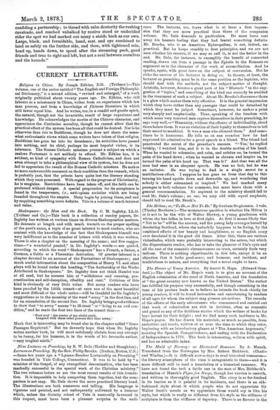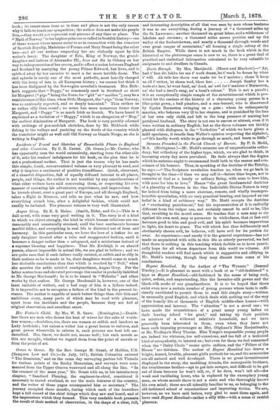The Maid of Norway : an Historical Romance. By A.
Munch. Translated from the Norwegian by Mrs. Robert Birkbeck. (Chatto and Windus.)—It is difficult now-a-days to read historical romances— the literary atmosphere of the time is antagonistic to them—and it is more difficult still to read a translation of a historical romance. We have not found the task a facile one in the ease of Mrs. Birkbeck's translation of Munch's Pigen fi a Norge, though her version is smooth, and written in thoroughly good English. The story is as far-fetched in its fancies as it is painful in its incidents, and there is an old- fashioned style about it which people who do not appreciate Sir Walter Scott's novels as we appreciate them would say is like his style, but which is really as different from his style as the stillness of sculpture is from the stiffness of tapestry. There is no flavour in the
book.-; its remoteness from us in time and place is not the only reason why it fails to touch our sympathies ; the author does not make his people live,—they would not represent real persons of any time or place. The " Maid of Norway "is the hapless princess so called in Scottish history—one of three women whose names occur to us in connection with the romance of Scottish Royalty, Madeleine of France and Mary Stuart being the other two—and all our notions respecting her are violently upset by this
writer's fancy. The daughter of Eric, King of Norway, the grand- daughter and heiress of Alexander III., does not die in Orkney on her way to take possession of her crown, and to effect a union between England and Scotland by marrying the young Prince Edward, but lives, and is spirited away by her enemies to meet a far more terrible doom. The real episode is surely one of the most pathetic, most heavily charged with the irony of fate in all European history ; we cannot but think it has been disfigured by the Norwegian novelist's treatment. Mrs. Birk- beck suggests that " Peggy," so commonly used in Scotland as short for Margaret (" pige" being the Norse for " girl " or" maiden "), may be a reminiscence of this time, when little Margaret, the " pige" from Norway, was so anxiously expected, and so deeply lamented." This strikes us as rather silly than sound ; no name has more numerous forms than Margaret, and "Peggy " is as much Irish as Scotch. We have heard it explained as a variation of " Meggy," which is an elongation of " Meg," the earliest diminutive of Margaret. The book is very prettily adorned with etchings of pen-and-ink sketches, done by Mr. Birkbeck while fishing in the valleys and yachting on the fiords of the country which the translator might as well call Old Norway as Gamle Norge, as she is writing in English.



































 Previous page
Previous page